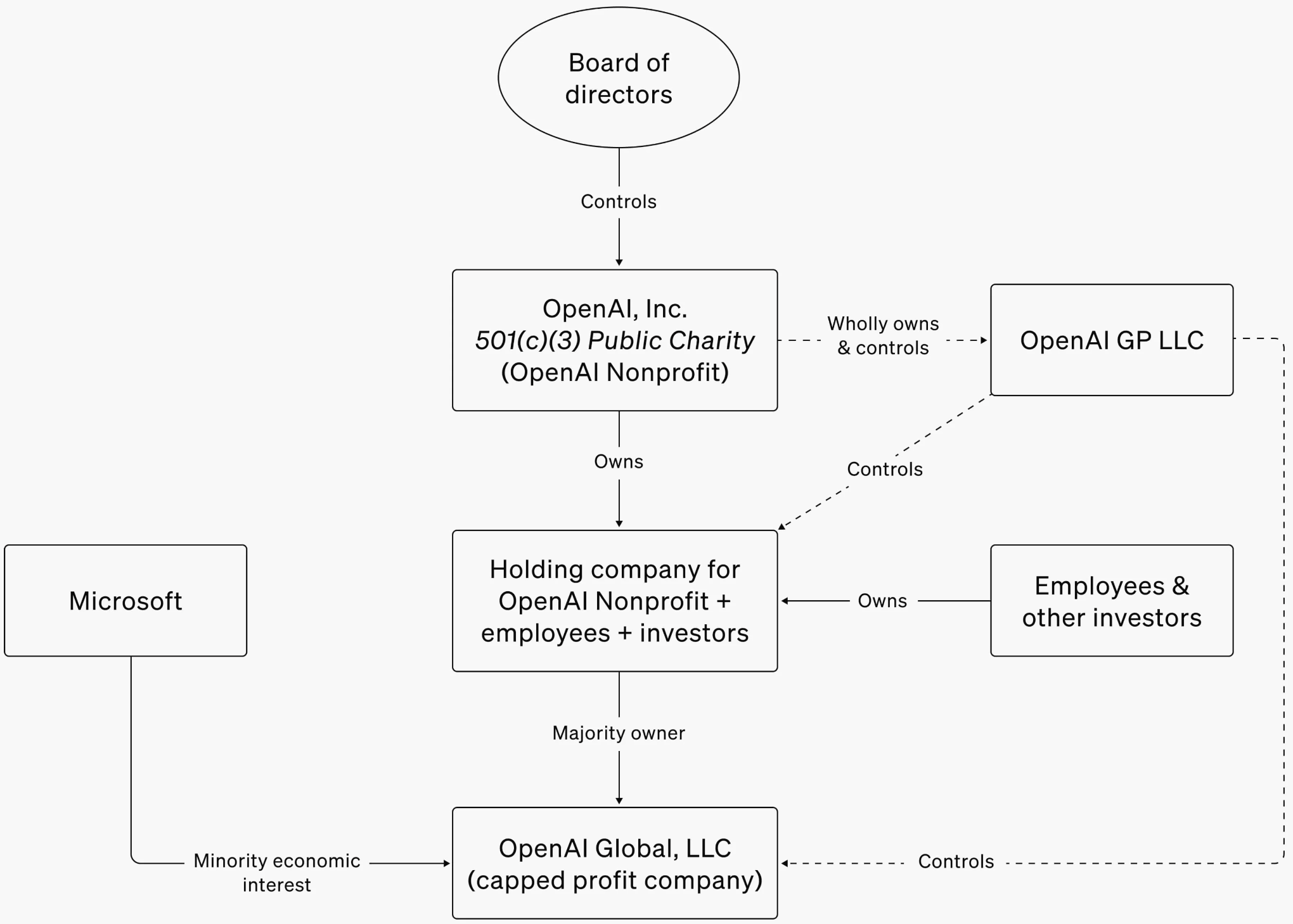
A Safety Warning About OpenAI
Posted September 27, 2024
Davis Wilson
ChatGPT developer OpenAI will soon be a for-profit business.
According to Reuters, the company is working on a plan to restructure its core business into a for-profit benefit corporation that will no longer be controlled by its non-profit board.
The controversial move is expected to make the company more attractive to investors.
For reference, here’s the current structure of OpenAI:

Yes, this is as complicated as it looks.
The gist is that unlike most technology companies, the OpenAI as we know it (the bottom box in the flow chart) is ultimately controlled by a non-profit board of directors.
These directors don’t have a fiduciary duty to investors like a traditional company’s board of directors. They have a duty to humanity to safely build (or shut down if needed) artificial general intelligence.
The reasoning behind this unique structure is that the founders determined artificial general intelligence would be so powerful and world-altering that OpenAI should operate for the benefit of humanity, not for profit.
Originally, the plan was for OpenAI to build artificial general intelligence and give it away for free. Its models were all supposed to be open-source (thus the name OpenAI) for all the public to see and understand.
The problem is that building a cutting-edge artificial intelligence company is expensive.
- OpenAI’s expenditure on chips, primarily Nvidia GPUs, amounts to hundreds of millions of dollars annually for both training and inference of large models.
- OpenAI spends a significant amount on Microsoft Azure – billions of dollars over the span of their partnership. This covers both the training of large models like GPT-4 and the real-time inference required to serve products like ChatGPT.
- OpenAI also competes with tech giants like Google, Meta, and Microsoft for top AI talent, which drives up salaries for AI researchers, engineers, and scientists. Top AI researchers can earn salaries exceeding $1 million annually, while compensation for software engineers can range from $200,000 to $500,000 annually.
Another problem is that having a technology company controlled by a board of directors who focuses on benefiting humanity probably isn’t the most competitively advantageous organization structure.
OpenAI competes in the most competitive technology field in the world.
OpenAI may have the goal of benefiting humanity, but that doesn’t mean its competitors have the same idealistic goal.
Unfortunately, any sort of red tape enforced by OpenAI’s board of directors puts them at a disadvantage, which ultimately doesn’t serve their purpose of leading the AI revolution in a way that is safe for humanity.
The timing of this report isn’t surprising, either.
The company is currently raising $6.5 billion that would value OpenAI at $150 billion, and reports indicate the round should close by next week.
Previous investors were famously told by OpenAI they should “view any investment in OpenAI Global, LLC in the spirit of a donation, with the understanding that it may be difficult to know what role money will play in a post-AGI world.”
As you can imagine, very few investors want to “donate” $6.5 billion without reasonable assurances in place. I don’t blame them!
This is why converting OpenAI into a for-profit company is the right thing to do, regardless of which side of the fence you are on.
Whether you support its mission to benefit humanity by building artificial general intelligence in the safest manner possible, or you believe OpenAI has the right to profit substantially from the technology they’ve created, neither happens without huge sums of money and an organization structure optimized to compete.
OpenAI’s restructuring achieves both of these.
Now all that’s left for OpenAI to decide is how “safe for humanity” they want to be going forward.
We’ll find out eventually.
